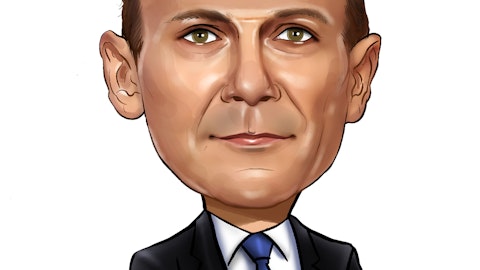2. Biogen Inc. (NASDAQ: BIIB)
Number of Hedge Fund Holders: 67
Percentage Decline in Stake in Q2: 100%
Biogen Inc. (NASDAQ: BIIB) is placed second on our list of 10 stocks Warren Buffett is selling. The company operates from Cambridge as a biotechnology firm. According to the latest data, Berkshire Hathaway sold off its entire stake in the company between March and June this year.
On August 2, investment advisory Mizuho maintained a Neutral rating on Biogen Inc. (NASDAQ: BIIB) stock and raised the price target to $300 from $244. Salim Syed, an analyst at the firm, issued the ratings update.
At the end of the second quarter of 2021, 67 hedge funds in the database of Insider Monkey held stakes worth $3.1 billion in Biogen Inc. (NASDAQ: BIIB), up from 63 in the preceding quarter worth $1.4 billion.
In its Q2 2021 investor letter, Longleaf Partners Fund highlighted a few stocks and Biogen Inc. (NASDAQ: BIIB) was one of them. Here is what the fund said:
“Biogen (52%, 1.24%), a biotechnology company specializing in therapies for the treatment of neurological diseases, contributed in a way that warrants a longer than usual writeup. When we first began buying the company in early January, the stock scored well on all three Business, People and Price criteria, but the range of outcomes was wider than most investments for us. On the business, while the company has had a leading position in neuroscience for decades, it had become a collection of assets that was hard for the stock market to value. This led to most short-term investors focusing on year-over-year (YOY) earnings declines in 2021 and pipeline uncertainty. We focused most on strong cash flows from Biogen’s Multiple Sclerosis franchise, a growing yet hidden biosimilars business, and a pipeline that we believed was actually quite interesting and diversified beyond the manic market focus on Aducanumab, a proposed treatment for Alzheimer’s. On the people front, we also liked what the board and management had been doing (large, discounted repurchases and prudent internal and external investments) and not doing (no big, dumb M&A or unsustainable dividends). Our single point appraisal was around $375/share, but we saw a range at the low end of slightly above $250 if the pipeline totally failed or approaching $500 if the company saw a reasonable amount of pipeline success. We also thought that we were effectively paying a very low double-digit multiple of FCF/share. It is important to note that we were not betting on our science expertise or any other predictions that fall outside our circle of competence. Rather, we used our bottom-up appraisal skills to find a security that was mispriced at that given moment – we had followed the company for over 10 years before our purchase – and that shorter-term investors were afraid to own due to the potential for near-term stock price volatility. We started with a partial position, as we felt the wider-than-usual range of outcomes and uncertainty around the stock could lead to the chance to fill it out at a better price later.
On June 7, the FDA approved Aducanumab (now known as Aduhelm) after a contentious process that has yet to fully play out. The stock shot upward, and our single point value increased to $425. With the stock trading at that level, we exercised our price discipline and sold our position. In this era of “multi-decade-compounders at any price” and given SAM’s history of being long term, it feels weird to be in and out of something so quickly. But it also feels OK to be able to use our appraisal skills to secure a payoff for our long-term clients. The company’s stock price has fallen since our sale, and we will continue to watch the price-to-value (P/V) gap going forward.”




